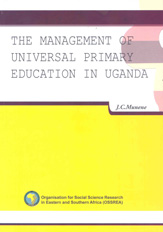Women In Agriculture & Rural Livelihoods
Women, Coffee and Climate
Modern Day Slavery
P/CVE Project
Migrating out of Poverty - Ethiopia
ELLA Project

Table Of Contents:
Chapter 1 Introduction
Chapter 2 School Community Social Capital and Educational Quality in UPE
Chapter 3 School Social Capital, School Climate and Educational Quality in UPE
Chapter 4 Learning Readiness and Universal Primary Education in Uganda
Chapter 5 Emerging Lessons: the Relevance of Social Capital and its Policy Implications at the Community and School Levels
Abstract:
INTRODUCTION
1.1 Critical Factors in Primary School Performance in Ugandan Schools
Prior to the introduction of the Universal Primary Education (UPE), the United States Agency for International Development (USAID), in collaboration with the Ugandan Government, had undertaken to improve the quality of teaching and learning in primary education. Some of the activities in the project were designed to equip primary schools with the instructional material, textbooks and syllabi they required. Others included the improvement in the management of primary education, the training of primary teachers (Teacher Development and Management System), and the construction of new primary schools in areas where they would be accessible to a larger population of the primary school going age group.
The author was commissioned, along with a number of colleagues, to evaluate the project. The team employed participatory learning and analysis methods to assess what teachers, pupils, head teachers, school management committees, parents and communities do. Data was collected on school performance. Unexpectedly, the number of books available in the schools did not relate to school performance as indicated by the number and quality of grades. Rather, school performance depended on a set of teacher and pupil practices. The Improving Education Quality (IEQ) Research (Uganda IEQ Core Team 1999; Munene et al. 1997; Carasco et al. 1996) isolated a number of teacher practices intensifying and decreasing the use of textbooks and improving school performance. They also indicated children practices affecting learning readiness. Teacher practices decreasing the use of textbooks included the following:
• Writing lesson objectives for the classroom periods, and in a way that enabled the teacher to measure whether or not the objectives were achieved;
• Selecting and preparing learning materials to reflect lesson objectives;
• Selecting and using teaching methods that physically engaged students in the achievement of lesson objectives;
• Controlling the class in order to achieve lesson objectives within the available time; and
• Designing and implementing a classroom seating arrangement that helped all students to attain lesson objectives.
The practices found to be related to a decreasing use of textbooks and negatively impacting on school performance included the following:
• Relying on personal knowledge, particularly study notes made during teacher training;
• Borrowing teaching notes from other teachers;
• Giving a “half-dose” to pupils (deliberately teaching less than what the curriculum called for);
• Spending time in activities that generate personal income in order to supplement salary; and
• Directing and pacing teaching in large classes for the pupils who understand.
The specific pupil practices identified in the research as contributing to learning readiness included:
• Going to school daily and working hard at writing and reading;
• Keeping one’s exercise book in good condition and reading all the lessons;
• Playing good games, keeping good hygiene, and looking smart
• Being disciplined and attentive in class; and
• Avoiding such actions as smoking, having sex, abusing teachers and the community on the way to and from school.
These concrete, qualitative findings shift attention away from secondary data, such as numbers of scholastic materials, including textbooks, available to what actually takes place in classrooms. They provide clear guidance regarding what needs to be changed in order to improve learning in schools. They demonstrate the importance of school climate, seen from the point of view of pupils and teachers. They also make it easier to develop valid and appropriate theories to account for why and how some pupils pass, while others fail.
This chapter is divided into five sections. The first section presents the general introduction, comprising of background and statement of the problem. The second outlines the general research question, as well as the specific research objectives. The third presents and discusses social capital as the concept providing a central framework for understanding the difficulties UPE implementation has to overcome. The fourth section outlines the methodology adopted in this study. The fifth section summarises the rest of the chapters in the report.

